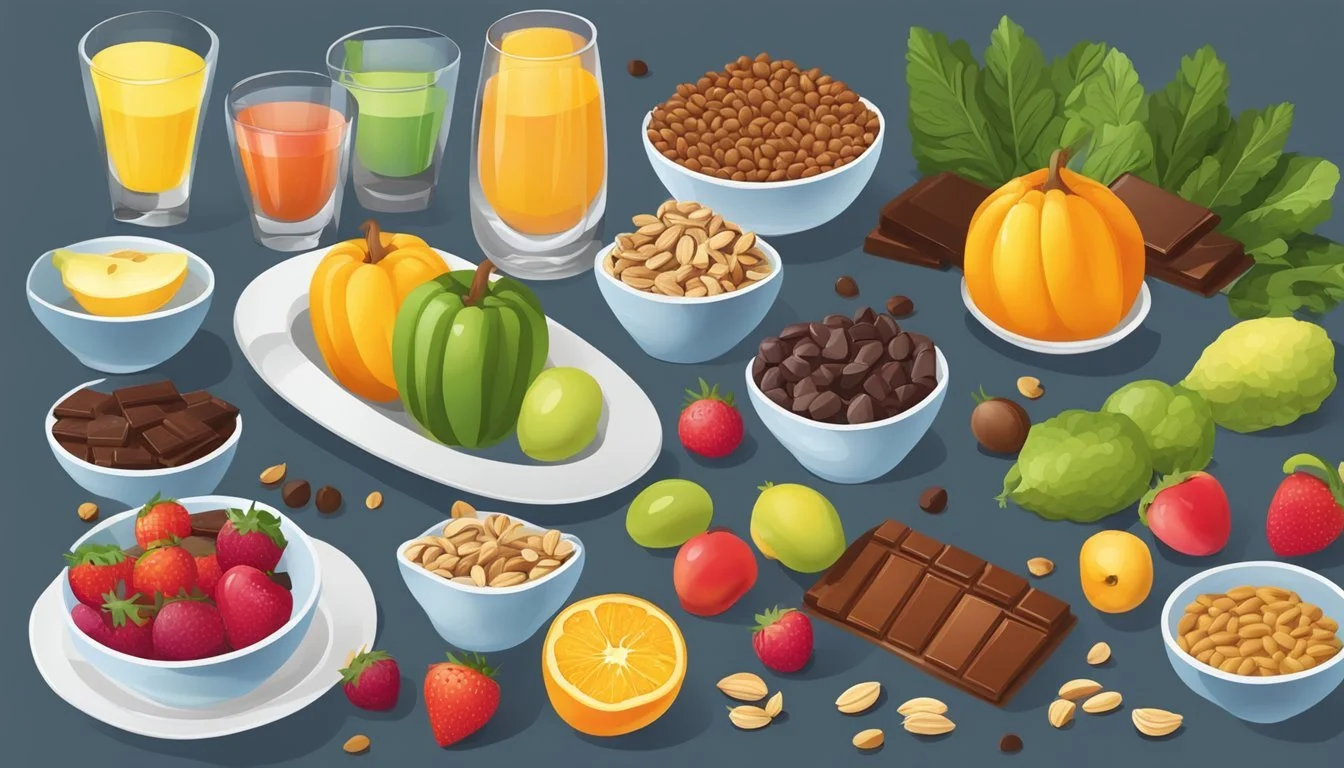Fertility-Boosting Foods to Enhance Sperm Quality Naturally
The quality of a man's sperm can significantly impact his fertility and overall reproductive health. With growing concerns over fertility issues, understanding how diet can influence sperm quality is essential. Nutrition plays a crucial role in maintaining and enhancing sperm count, motility, and morphology.
Incorporating specific foods into a daily diet can help improve sperm health and boost fertility. Nutrient-rich foods containing antioxidants, vitamins, and minerals support cellular function and protect sperm from damage. This article will explore various foods known for their positive effects on sperm quality, providing practical dietary suggestions for men seeking to improve their reproductive health.
1) Walnuts
Walnuts have been found to have a positive effect on sperm quality. Consuming walnuts daily can lead to improvements in sperm vitality, motility, and morphology. This makes walnuts a significant food choice for those looking to enhance reproductive health.
These benefits are likely due to the antioxidants and omega-3 fatty acids present in walnuts. These nutrients are essential for protecting sperm from oxidative damage and maintaining their overall health.
Studies have shown that eating around 75 grams of walnuts per day can lead to noticeable improvements. This intake has been associated with increased sperm vitality and better motility, which are crucial factors for effective fertilization.
Additionally, regular consumption of walnuts can lead to an increase in the percentage of normally-shaped sperm. This improvement in morphology further enhances the overall quality of sperm.
Walnuts are easy to incorporate into the diet. They can be eaten on their own, added to salads, or included in various dishes. Their versatility makes them a convenient option for those who want to support their reproductive health through diet.
2) Dark Chocolate
Dark chocolate is widely recognized for its potential benefits in improving sperm quality. It contains high levels of antioxidants, particularly flavonoids, which may help protect sperm from damage caused by oxidative stress.
In addition to antioxidants, dark chocolate is a rich source of L-arginine. This amino acid plays a role in improving sperm count and motility. L-arginine is believed to enhance blood flow, which can contribute to better overall sperm health.
The cacao in dark chocolate is a primary ingredient that provides these beneficial compounds. It is important to choose high-quality dark chocolate with a high cacao content to maximize the potential benefits.
Consuming a moderate amount of dark chocolate can be a part of a healthy diet aimed at improving sperm quality. However, moderation is key, as excessive consumption can lead to unnecessary calorie intake and other health issues.
Dark chocolate can be enjoyed on its own or incorporated into various dishes and desserts. This makes it an easy and enjoyable addition to a diet focused on boosting male fertility and sperm health.
3) Asparagus
Asparagus is widely regarded for its beneficial nutrients that can support sperm quality. It is rich in vitamins, particularly vitamin C, which acts as an antioxidant. Antioxidants protect sperm cells from oxidative stress, which can damage DNA and decrease motility.
Asparagus also contains significant amounts of folate, a B vitamin that plays a key role in DNA production and repair. Folate helps ensure that sperm cells develop correctly and maintain genetic integrity.
Furthermore, asparagus offers a good supply of glutathione, another potent antioxidant. These nutrients combined create an environment that supports healthier sperm production and functionality.
Adding asparagus to the diet is straightforward. It can be steamed, grilled, or roasted and makes a nutritious addition to various dishes. This vegetable not only complements a balanced diet but also supports reproductive health effectively.
4) Garlic
Garlic is renowned for its potential to enhance sperm quality, specifically sperm count and motility. This common kitchen ingredient contains several vitamins and nutrients beneficial to male fertility.
One of the key components of garlic is selenium, an antioxidant that helps protect sperm cells from oxidative damage. Selenium is crucial for maintaining the structural integrity of sperm cells.
Garlic also possesses vitamin B6, which has a role in maintaining healthy sperm production. It helps to regulate the balance of sex hormones, ensuring optimal sperm development.
Moreover, garlic contains allicin, known for improving blood circulation. Enhanced blood flow can lead to better erections and a healthier reproductive system overall.
Including garlic in the daily diet can be a simple and effective way to support male fertility. Whether used in cooking or taken as a supplement, garlic provides important nutrients that contribute to sperm health.
5) Oysters
Oysters are often highlighted for their potential in boosting male fertility. They are rich in zinc, a crucial mineral for sperm production and testosterone levels.
Zinc is known to improve sperm motility and count. A deficiency in zinc can lead to impaired spermatogenesis and decreased testosterone levels, both of which negatively affect fertility.
Oysters also contain other essential nutrients like Vitamin B12, Vitamin D, and Selenium. These nutrients play critical roles in maintaining overall sperm health and functionality.
Furthermore, the antioxidants found in oysters help protect sperm cells from oxidative stress, which can damage sperm DNA. Including oysters in the diet may, therefore, contribute to better sperm quality and protection against cellular damage.
Proper preparation and sourcing are important when consuming oysters to avoid foodborne illnesses. Fresh, well-cooked oysters are recommended for maximum health benefits.
6) Spinach
Spinach is a leafy green vegetable rich in vital nutrients. It contains high levels of folate, which is essential for healthy sperm production. Folate helps to reduce sperm abnormalities, contributing positively to sperm count and overall fertility.
This vegetable is also packed with vitamins like vitamin C and E. These antioxidants protect sperm cells from damage and improve motility.
Additionally, spinach offers a good amount of magnesium. Magnesium plays a role in testosterone production, thereby supporting sexual health.
Incorporating spinach into daily meals can be beneficial. It's versatile and can be added to salads, smoothies, or cooked dishes. Integrating this nutrient-dense vegetable contributes to better sperm quality and fertility.
7) Pomegranate Juice
Pomegranate juice is recognized for its potential benefits to sperm quality. It contains high levels of antioxidants, which can play a crucial role in protecting sperm cells from oxidative stress. Oxidative stress can damage sperm DNA and affect their motility and morphology.
Studies on animals have suggested that pomegranate juice may enhance various aspects of sperm health. These studies noted improvements in sperm count and motility, indicating that the juice could be beneficial for male fertility.
Pomegranate juice also contains vitamins, such as vitamin C and vitamin E, which are linked to improved sperm quality. These vitamins help neutralize free radicals, further protecting sperm from cellular damage.
Including pomegranate juice in the diet may be a natural way to support sperm health. It is widely available and can be easily incorporated into daily routines. Regular consumption, paired with a balanced diet and healthy lifestyle, might contribute to better reproductive outcomes.
8) Eggs
Eggs are a nutritious food that can contribute to improved sperm quality. Rich in protein, eggs provide essential amino acids that are building blocks for the body's tissues, including sperm.
Eggs also contain vitamin E, which has antioxidant properties. Antioxidants are important for protecting sperm cells from oxidative stress, a factor that can negatively impact sperm quality.
Another important nutrient found in eggs is folate. Folate is crucial for DNA synthesis and repair, which is vital for the production of healthy sperm.
In addition to these nutrients, eggs supply vitamin D. Some studies have indicated that adequate levels of vitamin D are associated with better sperm motility, which is key for fertility.
Eggs can be easily incorporated into a diet and prepared in various ways, making them a versatile option for anyone looking to support male fertility. Regular consumption as part of a balanced diet can provide multiple benefits for overall reproductive health.
9) Bananas
Bananas are rich in essential nutrients that can contribute to improved sperm quality. They contain vitamins A, B6, and C, which are crucial for healthy sperm development and function.
The vitamin B6 in bananas helps regulate hormones, which can positively impact sperm production. Bromelain, an enzyme found in bananas, is known to boost sperm motility.
This fruit is also a good source of antioxidants. These antioxidants protect sperm cells from oxidative stress, potentially enhancing sperm count and reducing abnormalities.
Furthermore, bananas provide a decent amount of folic acid. Folic acid is vital for DNA repair and synthesis, supporting overall sperm health. The eugenol and other nutrients in bananas can also help improve sexual health and vitality.
10) Brazil Nuts
Brazil nuts are highly regarded for their beneficial impact on sperm quality. These nuts are rich in both micro and macronutrients that can play a significant role in reproductive health.
One of the key components found in Brazil nuts is selenium. Selenium is an essential mineral that acts as an antioxidant, protecting sperm from oxidative damage. This protection can help improve sperm motility and morphology.
Additionally, Brazil nuts contain healthy fats that support overall reproductive function. These fats help maintain the integrity of sperm cell membranes, which is crucial for proper sperm function.
Brazil nuts also help reduce inflammation in the body due to their anti-inflammatory properties. Lower inflammation levels generally correlate with better reproductive health and can enhance the chances of conception.
Eating Brazil nuts may improve sperm quality and increase fertility in both men and women. Integrating a moderate amount of Brazil nuts into one's diet could support reproductive efficiency, making them a valuable food choice for those looking to improve sperm health.
Nutrients Essential For Sperm Quality
Enhancing sperm quality requires specific nutrients that target various aspects of sperm health including motility, morphology, and count. Two key categories of nutrients stand out: antioxidants and essential vitamins and minerals.
Role Of Antioxidants
Antioxidants play a pivotal role in protecting sperm cells from oxidative stress. Oxidative stress can damage sperm DNA, reduce motility, and lead to abnormal morphology.
Common antioxidants include Vitamin C, Vitamin E, and selenium. Vitamin C, found in fruits like strawberries and citrus fruits, improves sperm motility and count. Vitamin E, found in nuts and seeds, protects the sperm membrane from oxidative damage. Selenium, present in Brazil nuts and fish, supports sperm motility and morphology.
Antioxidants not only improve overall sperm count but also enhance their quality, leading to better fertility outcomes. Including these nutrients in the diet can significantly bolster sperm health by combating oxidative damage.
Impact Of Vitamins And Minerals
Vitamins and minerals such as zinc, folic acid, and vitamin D are crucial for sperm production and quality. Zinc, abundant in foods like meat, shellfish, and legumes, is vital for testosterone production and sperm motility.
Folic acid, found in leafy greens and avocados, helps prevent sperm abnormalities. Studies have shown that adequate folic acid intake enhances sperm count and overall fertility.
Vitamin D, which can be sourced from sunlight exposure and fatty fish, is linked to improved sperm motility and morphology. Adequate levels of these vitamins and minerals support robust sperm development and function. Including these nutrients in the diet can make a significant difference in male fertility.
Dietary Guidelines For Improving Sperm Quality
A diet rich in essential vitamins, antioxidants, and nutrients can significantly enhance sperm quality. Equally important is avoiding foods and habits that can negatively impact fertility.
Balanced Diet Recommendations
A balanced diet for improving sperm quality should include vitamins C and E, omega-3 fatty acids, and zinc.
Vitamin C can be found in foods such as oranges, strawberries, and tomatoes. Research shows it improves sperm motility and count.
Vitamin E is present in mangoes, avocados, and green vegetables like spinach and broccoli, which helps protect sperm from oxidative damage.
For omega-3 fatty acids, fatty fish like salmon and mackerel are excellent sources, promoting better sperm morphology and count.
Zinc and folate are crucial for sperm production and can be sourced from beans, leafy greens, nuts, and whole grains. Incorporating these into daily meals can lead to noticeable improvements in fertility.
Foods To Avoid
Certain foods and habits can harm sperm quality. Men looking to improve fertility should avoid processed meats, high-fat dairy products, and added sugars.
Processed meats, such as sausages and bacon, have been linked to decreased sperm count and poor morphology.
Excessive consumption of high-fat dairy products can negatively impact sperm motility and quality.
Foods high in added sugars and trans fats are also detrimental, as they can cause hormonal imbalances that affect sperm production.
It's also advisable to limit alcohol intake and avoid smoking, both of which can severely impair sperm health.
By focusing on specific positive diet choices and avoiding harmful foods, men can take significant steps towards improving their sperm quality.
Lifestyle Factors Affecting Sperm Health
Lifestyle choices like exercise routines and stress levels play crucial roles in maintaining and improving sperm health. Positive changes in these areas can significantly impact fertility.
Exercise And Physical Activity
Regular physical activity has been shown to improve sperm quality and count. Engaging in moderate exercise, such as swimming, jogging, or weightlifting, enhances blood flow and hormonal balance, which are essential for healthy spermatogenesis. Yet, excessive or intense workouts, particularly those leading to overheating, can reduce sperm count and motility.
Therefore, balancing exercise intensity and frequency is critical. Studies suggest aiming for 30 minutes of moderate exercise most days of the week. Additionally, it's important to avoid activities that expose the groin to prolonged heat, like hot tubs or saunas, as elevated temperatures can negatively affect sperm production.
Stress Management
Chronic stress can significantly impact hormone levels, particularly cortisol, which in turn affects sperm production and quality. Elevated stress hormones can interfere with the release of testosterone, a key hormone in sperm production. Practicing stress-reduction techniques is vital for maintaining hormonal balance and promoting healthy sperm.
Mindfulness practices such as meditation, yoga, and deep-breathing exercises have been proven to reduce stress levels. Additionally, hobbies and social activities that promote relaxation and well-being play an essential role. Ensuring adequate sleep and maintaining a healthy work-life balance also support lower stress levels, contributing to better reproductive health.









